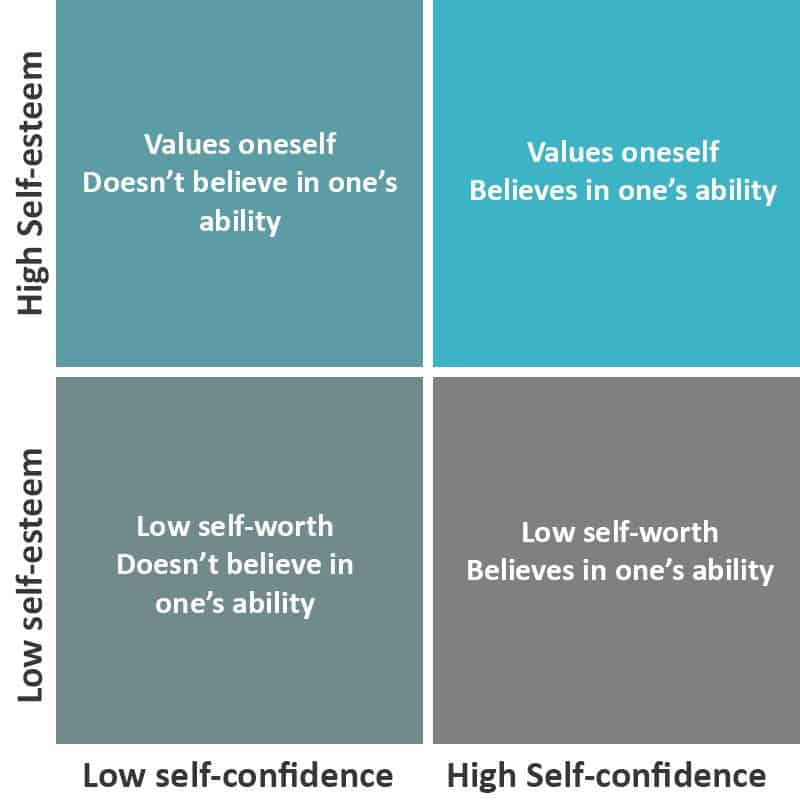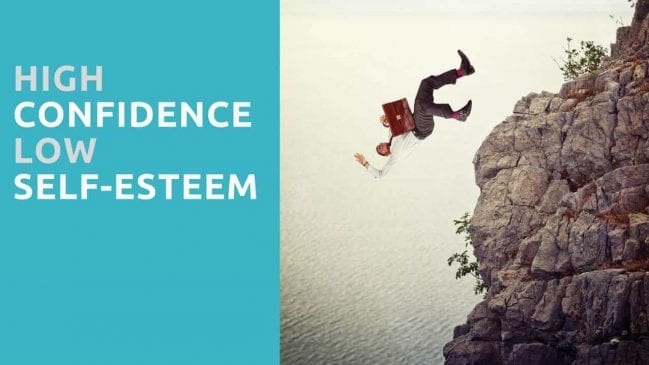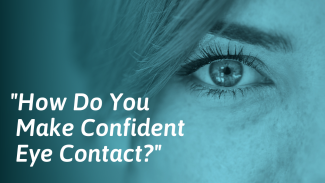I know this guy back in Sweden who’s very confident. He talks with a loud voice and has no problem taking up space.
Well, let me rephrase that: His problem is that he takes up too much space.
You see, he always has to be the center of attention. If he’s not, he doesn’t enjoy himself.
He has great self-confidence. In other words, he believes in his own social ability. He can tell stories that catches everyone’s attention and he knows that he can make everyone laugh.
What he doesn’t have is self-esteem. (I’m not trying to play hobby psychologist here – he’s going to a therapist and these are his own words.)
So what’s the difference between the two?
- Self-confidence is how much you believe in your ability to do something. (For example, taking the center stage in a social setting.)
- Self-esteem is what value you put on yourself. (How high you think that your self-worth is.)
That guy I know needs to constantly get the approval of others to feel self-worth.
He’s great at getting to know new people. He’s great with girls. He’s fun at parties. But – he’s terrible at long-term relationships because people tire of him.
What happens if you instead have HIGH self-esteem but LOW social self-confidence?
This person is probably afraid to take the center stage and take initiatives. But they don’t need to continuously feed their egos. This makes them more pleasant to be with – generally speaking.
But there are exceptions.
New studies show that more isn’t better when it comes to self-esteem.1 You want to have a decent self-esteem, but not a sky-high one. A sky-high self-esteem makes us unpleasant to be around and hard to relate to. For example, narcissists have a very high self-esteem, they see themselves as perfect.
Assuming you have a healthy dose of self-esteem, you’re more likely to have happy long-term relationships because you’re able to focus on what others need, too. (You’re not stuck constantly trying to feed your starving ego.)
Many methods we hear about to improve self-esteem doesn’t actually work. Most affirmations, for example, even make people with low self-esteem feel worse about themselves.2
But, how do you actually boost your self-esteem?
SocialSelf’s behavioral scientist Viktor Sander has written an in-depth article on ways to increase your self-esteem that actually work.
 Most people are actually somewhere in the middle, but it’s the most helpful to look at the extremes.
Most people are actually somewhere in the middle, but it’s the most helpful to look at the extremes.
Where are you in the matrix above? I’d love to hear your thoughts in the comments!









Thanks foe the article! I have a very high self-esteem, and an extremely low self-confidence. My self-esteem comes from an objective evaluation of my talents, physical appearence, and some of my main personality traits, but I have a huge problem with setting boundaries, have a huge guilt complexity and a fear to offend someone (who puts nose into my business). I am generally not afraid of confrontations, but I need to get angry to confront. I have no problems standing up for myself, but when someone is friendly, but too nosy, I feel bad about offending them by letting them know something is not their business. It’s just one example. Another is being too nice when I should take a more scolding tone instead of “it’s ok”. Also, I often myself tell people too much about my life (especially strangers) and then feel angry at myself. Thus
my communications with people are very often a pain, sometimes I see myself aukward. I know this comes from a childhood trauma, etc…, and I should work on it, etc… However, I am greatful to this short article for confirming to me that such a combination is possible. Usually, self-esteem ans self-condidence are balanced, that’a why in some articles the terms “self-esteem” and “self-confidence” are used interchangibly, which is wrong. Thus, they state that “empaths” have low self-esteem, but I am, as an empath, a counter-example of this.
Also, I almost often feel a need to demonstrate that I am smart. I know that this is a sign of a low self-esteem – and I do have a high self-esteem, and yet I do it… I think it comes from my general worry about being misunderstood or mistaken. I do not understand how this combines in me. Maybe you can help me understand?
I have high self-confidence and good self-esteem in most areas of my life but when it comes to relationships I am at the low end of the spectrum on both. I can see my value and accomplishments at work but my social life is almost nonexistent. I do well in sports and games but terrible in general social settings. I accomplish but seem to have trouble relating.
I feel like my biggest problem in life is that I have high confidence but lowwww self esteem. Even if I do a lot of things well, I still don’t value myself. This guy in this article is me 😛
Hi Zelda,
This article is well written and I would like to let you know, that it is not too late to develop and increase your self-esteem. I love the work of Nathaniel Branden and the 6 Pillars of Self-Esteem. You have the right to be successful, happy, and flourish in life.
This helped me realise.. I value myself a lot, I have quite high self esteem and I’m fairly confident too. Yet my “self” confidence is rock bottom. I have no belief in myself or my ability and feel everyone can see I’m useless and a waste of space. I admire people who are skilful and talented and feel invisible in comparison. I was always confused that I could feel this way and yet still somewhat stubbornly value myself. I understand a lot better now after reading this and I see that if I were to set some goals and achieve them my self-confidence would probably increase. The problem with such a low self confidence is that it does end up knocking your self-esteem. If you have any books to recommend in particular for me I would appreciate it. I’m 27 and female if that helps with the recommendations.
Hi Mary, we’ve actually done a top list with the best books on self-confidence and self-esteem over here:
https://socialself.com/blog/self-confidence-books/
https://socialself.com/blog/best-self-esteem-books/
Hi David, I’ve been reading through all of your blog posts and have found them immensely helpful. Some of the posts, however, recommend affirmations and some don’t. I’m confused.
Really glad to hear you found my blog posts so helpful! Affirmations is a complex subject. So I generally never recommend them because it’s mostly bad, especially for people with low self-esteem. But they do have their uses and I think you may have been confused when reading some of our other writer’s articles? Or maybe some really old article? But I commend your attention to detail, I hope you keep calling me out when I contradict myself. I appreciate it.